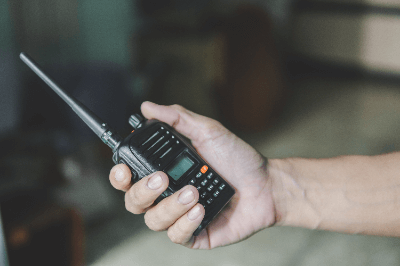What Is an IP Radio?
 An IP Radio is a press-to-talk (PTT)-based mobile communications service that transmits voice and data in VoIP format over cellular or Wi-Fi radio networks. It is also called an IP transceiver, PoC transceiver, or LTE transceiver.
An IP Radio is a press-to-talk (PTT)-based mobile communications service that transmits voice and data in VoIP format over cellular or Wi-Fi radio networks. It is also called an IP transceiver, PoC transceiver, or LTE transceiver.
In addition to IP radios provided by carriers themselves, there are also many companies that lease cell phone lines from carriers and operate IP radio services as MVNOs.
Since no license is required and costs are low, even small companies and individuals can use IP radios. They are used in business fields such as construction sites, warehouses, and the logistics industry.
Recently, IP radios have also been equipped with smartphone integration functions and are used in a wide variety of applications.
Uses of IP Radios
Since IP radios can communicate over a wider area than conventional radios and do not require base station facilities or licenses, they are used as a means of communication for business purposes at event sites, airports, subways, etc. over a large area.
IP radios are also used at fire departments and fire brigades, and at city halls as a means of communication in times of disaster, because they can share information with a large number of people and are easy to connect even in situations where telephone lines are congested.
Principle of IP Radio
IP radio uses VoIP (Voice over IP) to convert voice data into digital signals and transmit them as packet data. The communication network of the cell phone company is used as the transmission channel for the packet data.
Since data is encrypted between the IP radio and the cellular phone base station, secure communication is possible.
Types of IP Radios
There are several types of IP radios, depending on the shape and other factors.
1. Portable Type
Portable radios are compact in size and can be carried in a person’s hand and used while moving around. They are battery-operated and can operate for approximately 12 to 17 hours. They are suitable for use by event staff, traffic guides, security personnel, etc.
2. In-Vehicle Type
In-vehicle types are terminals that are installed in automobiles. Since they uses the car’s power supply, there is no need to worry about recharging the battery. They can be used for long hours and are suitable for use in trucks, cabs, etc.
3. Application Type
By installing an application on a smartphone, the device can be used as an IP radio. Functions such as recording, text-to-speech, and voice reading are provided as functions unique to the application.
Features of IP Radio
IP radios have the following features:
1. Many Available Locations
As long as cell phone signals are within range, radio signals can be received in places that are difficult to reach with ordinary radios, such as in mountain forests, between buildings, and underground.
2. Group and Individual Communications Are Possible
IP radios have many calling modes and can make individual calls as well as group calls. In group calls, it is possible to talk simultaneously with mobile stations subscribed to a single contract, or to talk with other command stations at the same time. In case of important or emergency calls, calls can be interrupted.
3. Stable Calls
Since IP radios use the cellular phone system, there is virtually no interference or interruption of calls while moving, which is experienced with other radios. Therefore, stable calls can be made.
4. Built-in GPS Function
The GPS built into IP radios can be used to determine the location of trucks and cabs. However, some models may not be equipped with this function.
5. Fixed Communication Fee
The communication fee for IP radio is fixed monthly, so there is no increase in the fee no matter how much you use it.
6. Easy to Connect During Disasters
Even in a situation of congestion due to a large number of calls during a disaster, it is relatively easy to connect because of packet communications.